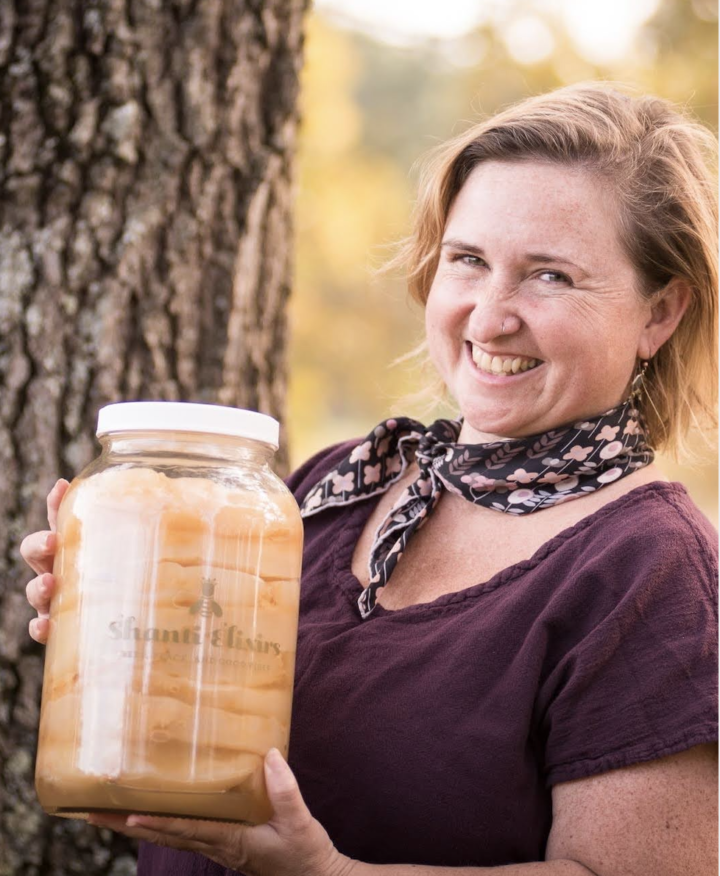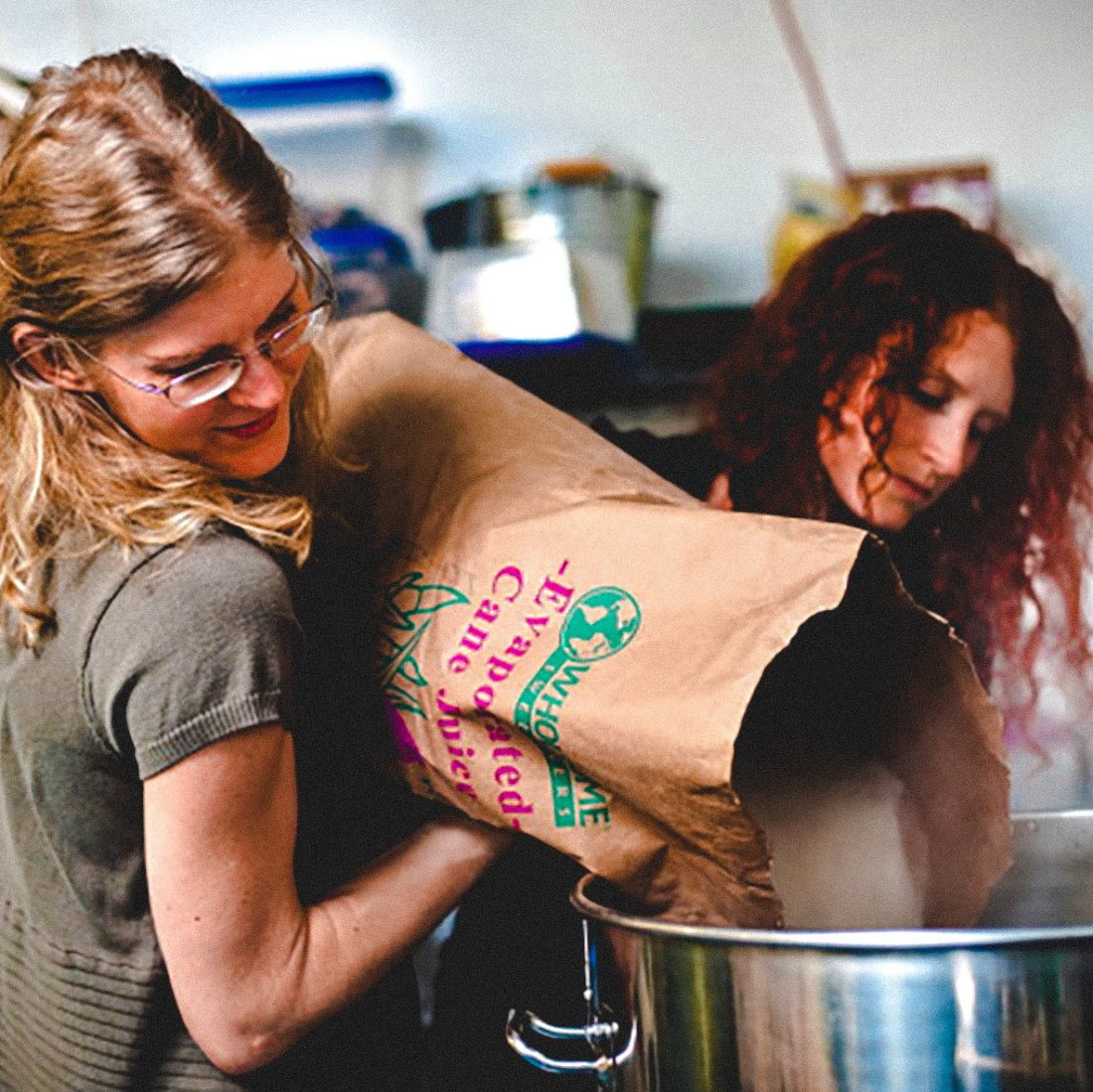Buchi founders Jeannine Buscher and Sarah Schomber met in 2008. At the time, both women had their children enrolled in the same home school cooperative. One day, Buscher explains, “The teacher came to my house before school was starting, and I offered her a glass of kombucha I had been brewing. Later, when she went to Sarah’s house for a visit, Sarah also offered her a glass of kombucha she was brewing. The beverage was so unusual at the time that the teacher told Sarah, ‘You have to meet this other mom.’”
A year later, Buchi was born.
While the company’s origin story is unique, its elements of motherhood and happenstance played key factors in the establishment of two other locally owned, female-led nonalcoholic beverage companies as well — Shanti Elixirs and Sarilla.
And those elements, particularly motherhood, continue to influence and inform how these three businesses operate. Because when it comes to balancing work and family, women entrepreneurs are clear: The juggle is real.
Products with a purpose
Rather than a serial entrepreneur, Sara Stender Delaney describes herself as a social entrepreneur. “I have never been driven by financials,” she says. “I always saw my businesses as mission driven and impactful and my products as purpose first.”
Though established in 2017, Sarilla’s origin dates to 2007, when Delaney lived in Rwanda, where she worked with genocide survivors. During that period, she also met and began helping Rwandan tea farmers connect with U.S. businesses. By 2016, Delaney herself became a buyer and distributor of packaged loose-leaf tea.
“I came up with the recipe for cold brew tea in my kitchen,” she says. “The demand for ready-to-drink beverages had more opportunity than loose-leaf tea, so I reached out to the Craft Beverage Institute at A-B Tech to help me develop the idea for a carbonated tea.” Originally called Silverback, all of Delaney’s products are now consolidated under the name Sarilla.
Like Delaney, Shanti Volpe‘s mission for her company, Shanti Elixirs, is fueled by more than mere profit. Volpe — whose parents met at a yoga retreat and whose family vacations included philanthropical trips to India and the Dominican Republic — was imbued since birth with the belief that food is medicine. “We did yoga and meditation daily, we were raised vegetarian, cooked from the garden, and my parents didn’t drink alcohol,” she says. “I chose to continue that path myself.”

But finding healthy and delicious nonalcoholic beverages to drink was often a challenge — until Volpe attended a sacred beekeeping workshop in 2016 and had her first taste of jun. “I felt an immediate effect on my body and was so intrigued I knew I had to learn how to make it,” she says. “I brought home a SCOBY [symbiotic culture of bacteria and yeast used as the “mother” for fermented beverages] and started brewing the very next day.”
A quest for healthier options is also what inspired Buscher’s and Schomber’s interest in kombucha. By the time the pair met in 2008, Buscher was already in the process of getting her kitchen certified to produce kombucha to sell at local tailgate markets. Meanwhile, “Sarah’s husband had been encouraging her to start a business with another mother, so when I told her I was getting certified, she asked if I wanted to do it together,” Buscher explains.
The pair fine-tuned the product in Buscher’s kitchen that fall, then moved to the Blue Ridge Food Ventures commercial kitchen to build inventory before debuting their Buchi kombucha — under the limited liability corporation Asheville Kombucha Mamas — at the North Asheville Tailgate Market in spring 2009.
Asheville’s interest in healthy alternative beverages was immediate and tremendous, Buscher recalls. “When I first started brewing kombucha, we were living in Dallas,” she notes. “My friends were like, ‘What do you mean it’s alive? That’s weird, you’re weird!’ Asheville embraced the weird and the health-based mission.”
Growth spurts
Running and growing a business while parenting is challenging, to say the least, but all four women say the two have much in common, and that business can benefit from their skills as mothers.
When Buchi outgrew Blue Ridge Food Ventures, Buscher and Schomber moved operations and their residences to a 120-acre property in Weaverville that included an on-site 7,000-square-foot building originally constructed as a warehouse for beer and wine distribution. “We stayed there for six years, and that was pivotal to our growth of the business, but also to raising our families while growing a business,” Buscher says. “Our children played together and ran around the property together. Even though we worked all the time, we were always around our families.”
They note that before starting the business, they had both been stay-at-home moms and had admittedly unrealistic expectations of maintaining that lifestyle while also starting and growing a business. But it worked out.
Adds Schomber, “Work and life were a blend that went together, and I truly think if we didn’t have that time where we got to know each other on such a deep level and navigate some really tough times we might not have made it.”
Delaney, on the other hand, initially flew solo, while also being a single mom from the get-go. She says the experience has been both difficult and helpful. “From the time my son was born, I had to learn how to become efficient and prioritize,” she says. “It helped me learn time management. I work more than I would if I were working for someone else in a job, but having my own business also gives me flexibility to be at his baseball games and here when he gets home from school.” As her business has grown, Delaney continues to add staff.
Volpe points to other traits she brings to the table as a woman and mother. “Women do things differently. I have very high expectations coupled with a generous amount of flexibility and compassion,” she explains. “I think parenting set me up for great success in figuring out how to be a business owner. I often look at Shanti as my baby and I treat Shanti Elixirs and my employees as my family. That’s how I nurture them.”
Buchi’s co-mother Schomber agrees. “We have 115 employees now, and it’s like having 115 children! The goal is to keep them all motivated, focused and moving in the same direction while feeling valued and cared for.”
Into the future

In January 2017, Buchi moved to a 30,000-square-foot building in Marshall. In addition to increasing employment, the company continues to increase distribution, volume and product line. It has just introduced Living Energy in two flavors — raspberry lime and lemon mint. The drink adds a boost of 100 milligrams of clean caffeine to kombucha, along with L-theanine and lion’s mane mushrooms.
“Kombucha was our jumping-off point,” says Buscher. “We see ourselves continuing to experiment and come out with new products and being part of the functional beverage trend. Never stop innovating or you’ll go backward.”
Adding to her own mix, Delaney recently introduced two new Sarilla products as well — caffeine- and sugar-free botanical infusions in two flavors, vanilla rooibos and Tulsi lime. She intends to expand Sarilla’s distribution reach. “My goal is to become a nationally known brand.”
For Volpe, who now has 14 employees, her immediate goal is to get Shanti Elixirs as a craft nonalcoholic option in as many bars, breweries and restaurants in Asheville as possible. But she’s also thinking bigger.
“We want to continue to grow our collaborations with other Asheville makers like French Broad Chocolate, Asheville Tea and Wedge Brewing Co. for new flavors,” she says. “My long-term goal is to create a destination location/retreat center/nonprofit honeybee apiary and junery taproom, with a bar that features all the great nonalcoholic beverages made in our region that everyone can enjoy.”




Before you comment
The comments section is here to provide a platform for civil dialogue on the issues we face together as a local community. Xpress is committed to offering this platform for all voices, but when the tone of the discussion gets nasty or strays off topic, we believe many people choose not to participate. Xpress editors are determined to moderate comments to ensure a constructive interchange is maintained. All comments judged not to be in keeping with the spirit of civil discourse will be removed and repeat violators will be banned. See here for our terms of service. Thank you for being part of this effort to promote respectful discussion.